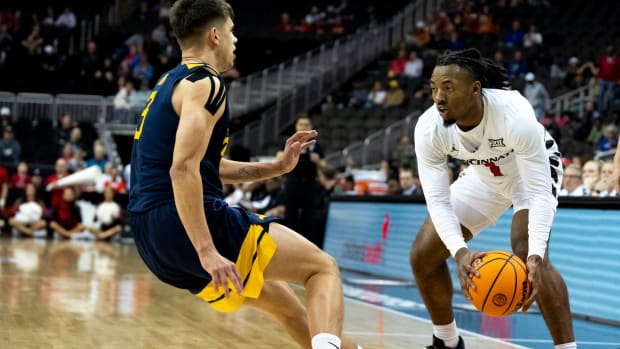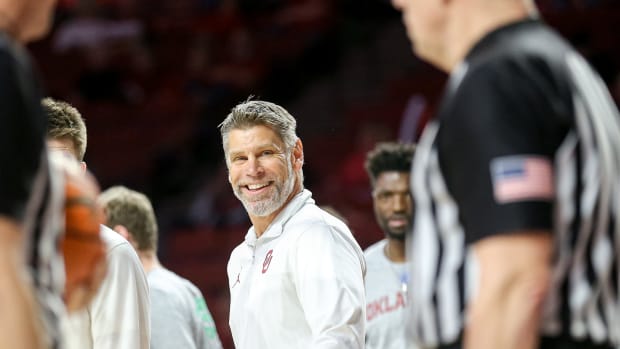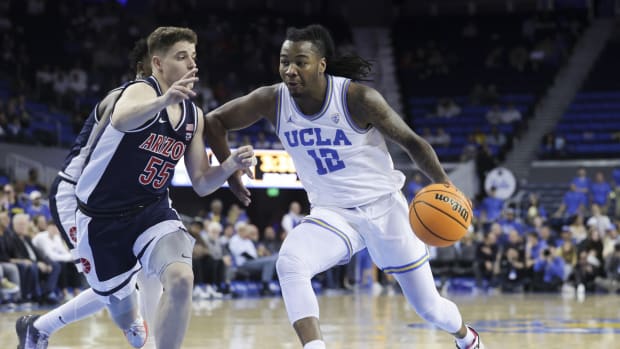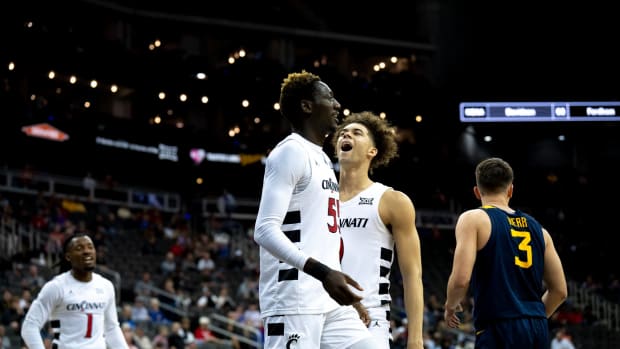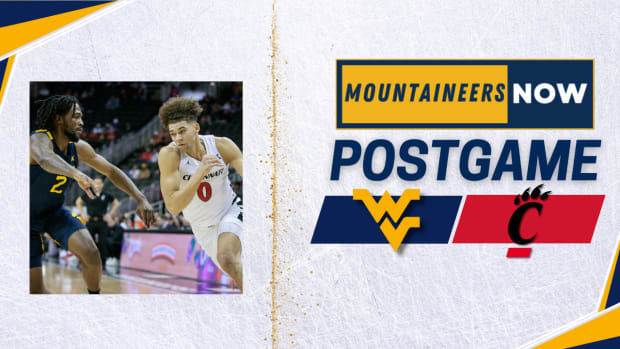NCAA case has Louisville making wrong kind of history—and likely vacating a national title
What a landmark day in the wholesome world of college athletics.
June 15, 2017, is the first time that the NCAA's Committee on Infractions has issued a public decision detailing how a university staffer paid prostitutes to perform sex acts for minors the university was recruiting. Among the details in the NCAA's finding against Louisville's men's basketball program is that former director of operations Andre McGee arranged these activities to take place in the school's majority-basketball-player dorm, Minardi Hall, and that "four of the prospects who engaged in sex acts [with prostitutes] were 17, while one other was 16." It also quotes an additional 16-year-old Louisville recruit as telling NCAA investigators the following happened after a strip-tease party at Minardi Hall:
[McGee] handed me a condom and said go wait for me upstairs. And I went upstairs for probably 10 or 15 minutes and one of the girls came up to my room and I didn't really say much. And she was just like, you know, you're nervous, you don't have to do this if you don't want to. And I was like, all right, well, I'm fine then. She was like, well, it's nice meeting you and she left.
It is also the first time in an NCAA decision that a university had the gall to argue that its penalties be downgraded because the hookers were not very expensive. Louisville contended that the alleged $5,400 McGee spent on escorts for recruits and active players between December 2010 and July 2014—money that constituted impermissible benefits, and thus made those players ineligible at Louisville—was not a significant sum. It's right there in the report, but the NCAA did not agree with this line of thinking, writing:
[Louisville] made this argument based solely upon the assigned monetary value of the striptease dances and sex acts. However, the panel considers other factors besides monetary value in determining the level of violations. In this instance, the panel need not ascertain an exact value of the activities. The nature of the violations themselves, without more, elevates them to Level I. The types of activities that occurred in this case were repugnant and threaten the integrity of the NCAA Collegiate Model, regardless of any precise dollar value assigned to them.
It is also the first time—and this is the landmark portion making headlines today—that a men's basketball national championship stands to be vacated if the NCAA's decision holds up on appeal. Because the decision declared that any Louisville players involved in the incidents at Minardi Hall were ineligible, Louisville will have to vacate all games in which those players participated, including NCAA tournament appearances, and pay back millions of dollars in NCAA tournament revenue distributions it received from the ACC during that time.
Although the NCAA did not state it explicitly in its report or a follow-up press conference, Louisville confirmed that both its 2012 Final Four appearance and 2013 national title are in jeopardy of being vacated. The 2013 banner would be the first to ever come down as the result of an NCAA decision, and record books would not list any national champion for that season. (Michigan would remain the runner-up.)
Perhaps the length of time this scandal has been in the news—it broke in 2015, when escort Katina Powell released a tell-all book—is what numbed key Louisville figures to the disturbing central facts—once again, that a staffer overseeing recruiting operations paid prostitutes to have sex with underage recruits—and empowered them to push back aggressively about keeping that cherished title banner. Shortly after the 11 a.m. release of the NCAA's decision, Louisville stated its intent to appeal, and a lawyer for head coach Rick Pitino called the finding "one of the weakest I've ever seen against a head coach." Pitino, who was charged with "failure to monitor" his program and suspended for five ACC games, appeared deeply aggrieved in Louisville's 12:30 p.m. press conference. One of the first things he said was, "I've lost faith in the NCAA and everything I've stood for, for the last 35 years, with what they just did."
Pitino also said, "This is over the top. It's to the point where it's not even conceivable what I just read."
He was not referring to the 16-year-old Louisville recruit's account of being sent, unwillingly, into a potential sexual encounter with an escort, or the 17-year-old's account of receiving oral sex on a recruiting visit, or the instance where an escort and her daughter were paid to go to a hotel and have sex with a Louisville recruit and the recruit's AAU basketball coach.
Pitino was instead talking about the NCAA dropping the hammer on his program. He was talking about the NCAA finding that he was reasonably responsible for monitoring late-night activities at the team's majority-basketball dorm and that the school should vacate multiple seasons' worth of results, including that 2013 national title. The NCAA found no proof that Pitino knew anything about the Minardi Hall scandal while it was happening, and there are no allegations from recruits, players or coaches that Pitino knew, either.
There is also no longer naiveté protection for head coaches in these kinds of NCAA cases, which in a previous era always fell on the head of some "rogue" staffer. Thus the complete ignorance that Louisville is professing was not an effective defense against NCAA penalties.
It is worth mentioning, too, that the NCAA stopped short of definitively concluding that everyone other than McGee was ignorant of the events. The finding included some potentially contradictory statements from recruits:
Prospect 4 related an incident after he enrolled when assistant coach 3 made a comment to the team that it had practiced poorly "because y'all had strippers in there all night." He felt that assistant coach 3 may have known of the incidents, as assistant coach 3 was "close" to the former operations director. Prospect 2 spoke of it being "common knowledge" that the activities were occurring. However, all other individuals, including many who lived in Minardi Hall, stated that the incidents were not known to all team members.
Something that everyone at Louisville will admit to remembering is the 2013 national title, which will be vacated unless the school earns an unexpected victory on appeal. The concept of vacating any sports victory is strange—there's video of it, the Georgia Dome was full, I covered it for SI, the players have rings, Pitino has a tattoo commemorating it on his back—but there will be shame associated with having to act, publicly, as if it didn't happen.
And in a state where one college hoops rivalry matters more than anything else, one of the few things Louisville had on Kentucky's John Calipari was that his Final Fours at UMass and Memphis had been vacated by the NCAA. Now Pitino could have to vacate a Final Four and—in a historic first—a national title, one-upping his in-state nemesis in the most unwanted way imaginable.

